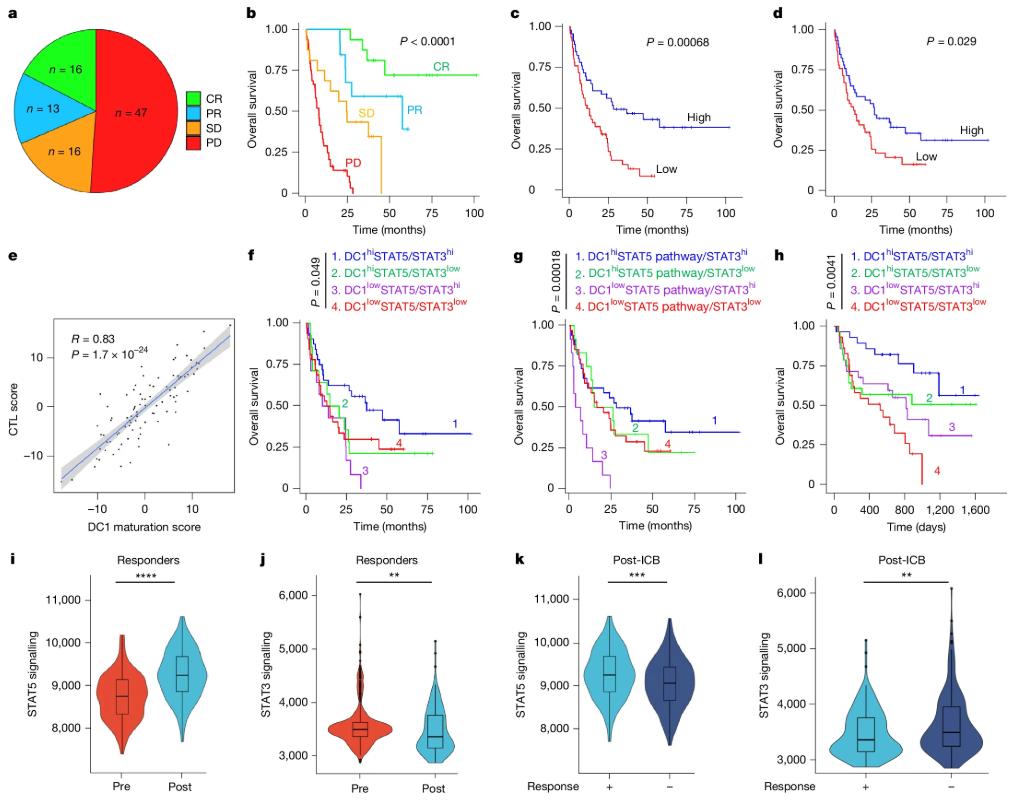In the field of cancer treatment, immunotherapy is like a brave warrior, which can use the body's own immune system to fight cancer cells. Among them, immune checkpoint inhibitors (ICBs), as an important branch of immunotherapy, can activate immune cells by blocking specific proteins so that they can more effectively eliminate cancer cells. However, reality is not always as people wish. Many patients do not respond well to ICBs, and even gradually develop drug resistance during treatment. This problem has been plaguing the medical community.
Recently, in a research report entitled "STAT5 and STAT3 balance shapes dendritic cell function and tumour immunity" published in the international journal Nature, scientists from the University of Michigan and other institutions conducted a groundbreaking study to reveal the impact of the balance between STAT3 and STAT5 proteins on the effect of immune checkpoint therapy, thus bringing new hope to cancer treatment.
| Cat.No. | Product Name | Price |
|---|---|---|
| CLKO-0142 | STAT3 KO Cell Lysate-HeLa | Inquiry |
| CSC-RT0636 | Human STAT3 Knockout Cell Line-HeLa | Inquiry |
| CSC-RR0394 | STAT3 Luciferase Reporter Cell Line - HeLa | Inquiry |
| CSC-DC015282 | Panoply™ Human STAT3 Knockdown Stable Cell Line | Inquiry |
| CSC-SC015282 | Panoply™ Human STAT3 Over-expressing Stable Cell Line | Inquiry |
| CSC-RR0481 | STAT3-Luc Reporter Cell Line-Ba/F3 | Inquiry |
| LV00997L | STAT3 Firefly luciferase reporter lentivirus (Neo) | Inquiry |
| AD15641Z | Human STAT3 adenoviral particles | Inquiry |
| LV00998L | STAT3 Firefly luciferase reporter lentivirus (Puro) | Inquiry |
| LVG00102Z | IL6/STAT3 Luciferase Reporter Lentivirus | Inquiry |
The immune system is like the "army" of the human body, in which T cells play the role of "soldiers" responsible for destroying tumor cells. Dendritic cells (DCs) are "generals" that can patrol in tissues to capture abnormal proteins and present them to T cells to activate them. By analyzing the RNA sequencing database of cancer patients, the researchers found that STAT3 and STAT5 can jointly regulate the number of dendritic cells. These two proteins activate different types of genes through transcriptional signals and thus affect the function of dendritic cells. Researchers believe that patients who respond to immune checkpoint inhibitors have stronger STAT5 signals and weaker STAT3 signals.
Researcher Professor Weiping Zou pointed out that resistance to cancer immunotherapy is a huge problem faced by cancer patients. Therefore, it is crucial to understand the mechanism behind it and find a solution. In the article, the researchers used a mouse model to further confirm that STAT3 would offset the effect of STAT5 and thus hinder the maturation of dendritic cells and the activation of T cells. This discovery not only obtained consistent results in a variety of tumors such as skin cancer, ovarian cancer, breast cancer, lung cancer and colon cancer, but also revealed an unknown mechanism of immune checkpoint resistance.

Figure 1. Role of DC STAT5 and STAT3 in ICB. (Zhou J, et al., 2025)
Although STAT3 has been studied for many years as a target for cancer treatment, it is difficult to target and is considered "undruggable". However, the research team cleverly used the existing protein degradation system in the human body to develop two molecules, SD-36 and SD-2301, which can target STAT3 for protein degradation. In cell lines and mouse models, STAT3 degradation not only enhances immune response but also improves STAT5 signaling. Both molecules have shown good effects in treating large, advanced tumors and tumors resistant to immune checkpoint inhibitors.
This study not only revealed the interaction between STAT3 and STAT5 in dendritic cells and its impact on the efficacy of immune checkpoint therapy, but also successfully developed molecules that can target and degrade STAT3. This discovery is expected to help patients who do not respond well to traditional immunotherapy or develop resistance, bringing new treatment hope to them. As the importance of immunotherapy in cancer treatment becomes increasingly prominent, this study not only provides new ideas for solving the problem of immune checkpoint resistance, but also opens up new paths for the development of future cancer treatment.
The next step is to conduct clinical trials to verify the safety and effectiveness of these STAT3 degraders in humans. Given the activation status of STAT3 in a variety of cancers, these molecules are expected to bring good news to a large number of cancer patients. In the future, as more clinical trials are conducted, we expect these innovative treatment strategies to truly translate into good news for patients, allowing immunotherapy to play a greater role in cancer treatment.
Reference
Zhou J, et al. STAT5 and STAT3 balance shapes dendritic cell function and tumour immunity. Nature, 2025: 1-10.

